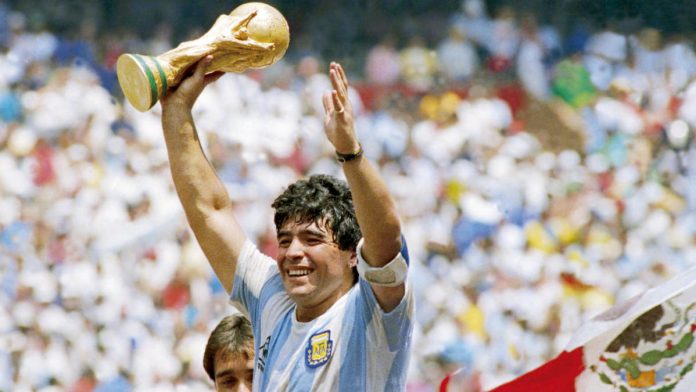
“A little with the head of Maradona,
And a little with the hand of God.”
Diego Maradona, who died on 25 November at the age of 60, was more than a great footballer; he was one of the most iconic players in the history of the game, a legend in his own lifetime.
He had been admitted to hospital on 2 November and released ten days later after undergoing a successful brain surgery, and was recuperating at his home in Tigre, Buenos Aires, when he died of a heart attack on 25 November. Following a private ceremony attended by close relatives, Maradona was laid to rest on Friday at the Bella Vista cemetery on the outskirts of the city, next to the graves of his parents.
A day earlier, emotional scenes were witnessed in front of the Presidential Palace in Buenos Aires, where his coffin draped in Argentina’s national flag and his trademark number 10 football jersey, had been placed on public display. Huge crowds turned out to pay their respects to their national icon, with many weeping, clapping, praying and blowing kisses as they filed past his coffin.
Regarded as one of the greatest players of all time, Maradona was one of the two joint winners of the FIFA Player of the 20th Century award, along with the Brazilian football legend Pelé. On being informed of the death of his fellow great footballer, the 80-year old Pelé said that it is so sad to ‘lose friends this way’. “Certainly, one day we’ll kick a ball together in the sky above,” he said in a statement to the media.
Maradona and his fellow Argentine footballer Lionel Messi are also the only players to win the Golden Ball at both the FIFA U-20 World Cup and FIFA World Cup. As coach of the Argentina team from 2008-2010, Maradona managed Messi who was then emerging as the next Argentine great. Messi mourned the death of his former coach and said, “It is a very sad day for all Argentines and for football. He is leaving us but he is not going, because Diego is eternal.”

Diego Armando Maradona was born on 30 October 1960, in Lanús, Buenos Aires Province to Diego Maradona ‘Chitoro’ and his wife Dalma Salvadora Franco. Born in a poor family, he was raised in Villa Fiorito, a shanty-town on the southern outskirts of Buenos Aires where he first began kicking ball. Maradona received his first soccer ball as a gift at age three and quickly became devoted to the game.
By age eight, he was playing in his neighbourhood club Estrella Roja, and as a 12-year-old ball boy, he amused spectators by showing his wizardry with the ball during the halftime intermissions of first division games. A precocious talent, Maradona was nicknamed ‘The Golden Kid’, a name that stuck with him throughout his career.
He made his full international debut at age 16 in a national game against Hungary, and two years later represented Argentina at the 1979 FIFA World Youth Championship in Japan, where he scored a total of six goals in six appearances in the tournament. He went on to play for Argentina in two Copa América ties against Brazil and against Bolivia in 1979.
In his international career with Argentina, he earned 91 caps and scored 34 goals and played in four FIFA World Cups . In the 1986 World Cup in Mexico, Maradona captained Argentina and led the team to victory over West Germany in the final, and also won the Golden Ball as the tournament’s best player. However, it was for his goals in the quarter-final of this tournament that Maradona will always be remembered in football’s history.
In the quarter-final game against England he scored both the goals to clinch a 2–1 victory over the English team. The first goal was a handing of the ball by Maradona as he jumped to head the ball past the goalkeeper into the net, the foul went unnoticed by the referee and a goal was awarded. Maradona was later quoted as saying the goal came, “a little with the head of Maradona and a little with the hand of God”. His second goal in the same game was even more dramatic, he did a 60-meter dribble with the ball past five England players to score a goal that was voted as the ‘Goal of the Century’ by FIFA.com voters in 2002.
Maradona’s stellar football career was often marred by a chequered personal life, with alleged drug abuses, weight gains, obesity and financial problems. He married long-time fiancée Claudia Villafañe in 1984, but the two divorced in 2004; the couple had two daughters.
Despite his frailties, Maradona’s death triggered mourning around the world, and nowhere was it felt more fervently than in his home country Argentina where he will forever be remembered as an irredeemable but irreplaceable national hero.
















